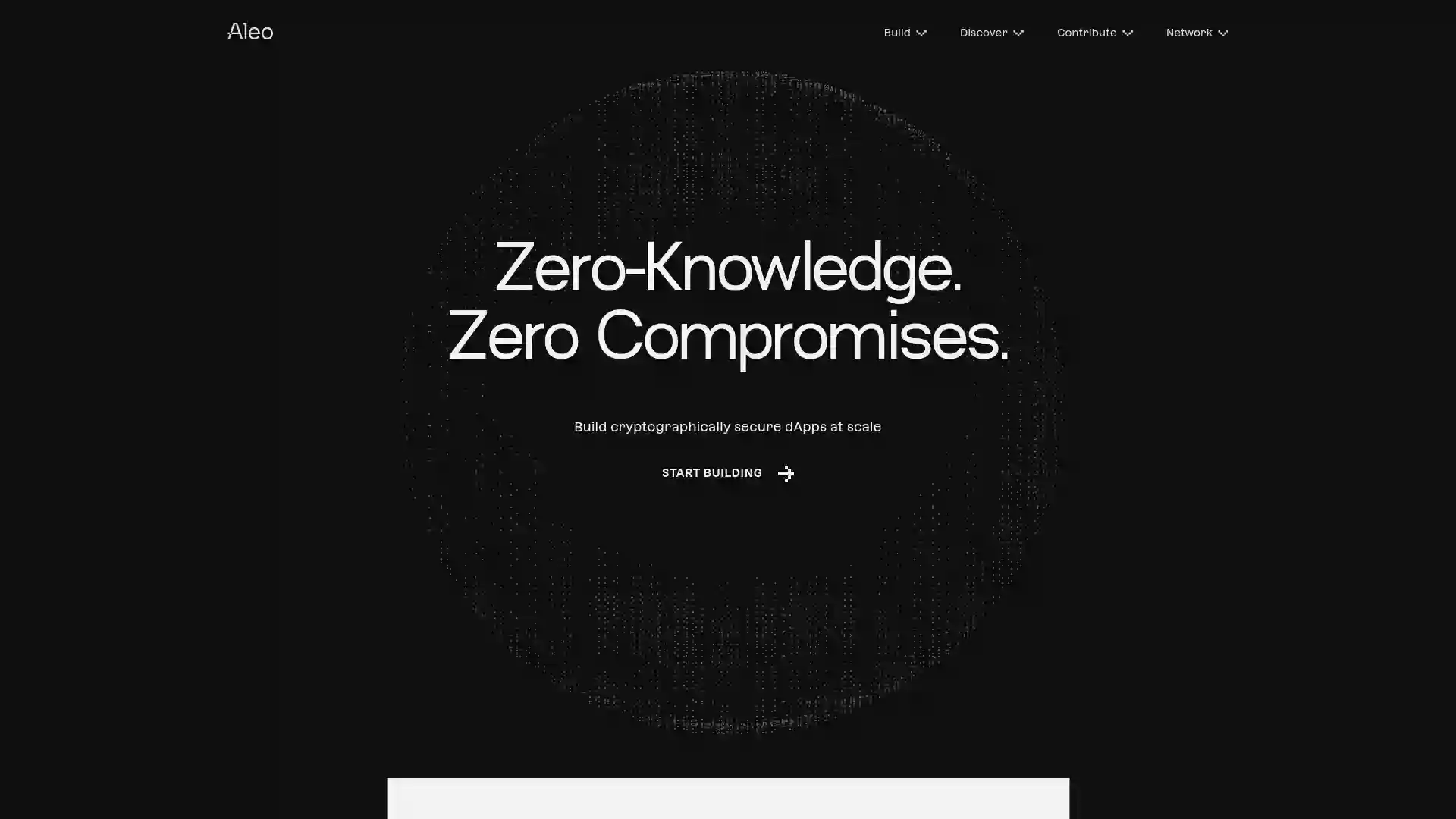ALEO (ALEO)
Aleo is a Layer 1 blockchain that focuses on privacy, utilizing the ALEO token to support decentralized applications and programmable smart contracts. It incorporates zero-knowledge proofs (ZKPs) to facilitate secure and confidential data interactions, while maintaining scalability and functionality. This innovative approach allows Aleo to perform private and verifiable transactions, addressing privacy challenges in traditional decentralized systems.
The blockchain's infrastructure is underpinned by technologies like snarkVM, snarkOS, and the Leo programming language. These tools enable Aleo to merge privacy, decentralization, and scalability within a single ecosystem.

| Ticker | ALEO |
| Category | Smart Contract Platform |
| Website | https://www.aleo.org/ |
| @AleoHQ |
Blockchain technology began with Bitcoin in 2009, introducing decentralized digital currency. Ethereum expanded this concept by enabling programmable smart contracts. However, privacy has been a persistent challenge, as wallet addresses can often be traced. Aleo addresses this through zero-knowledge cryptography, which verifies transactions without revealing sensitive information, ensuring confidentiality while supporting secure applications in Web3 ecosystems.
Aleo was founded in 2019 by Howard Wu, Raymond Chu, and Collin Chin. Key milestones in its development include:
- 2019: Establishment of Aleo and initiation of development.
- 2020-2022: Launch of testnets to refine network capabilities.
- 2022: Completion of a $200 million Series B funding round.
- 2024: Official launch of the mainnet on September 18.
Aleo ecosystem
The Aleo ecosystem includes various tools and services designed to enhance privacy and functionality. These components cover infrastructure, decentralized finance (DeFi) platforms, wallets, identity management, and development tools.
Tooling and development
- Aleo123: A block explorer and data analytics platform for tracking transaction data and network activity.
- Obscura: Provides RPC endpoints, APIs, and SDKs for developers to create zero-knowledge dApps.
Identity management
- Aleo Name Service (ANS): Converts complex addresses into confidential names, simplifying user interactions.
Decentralized finance (DeFi)
- AlphaSwap: A platform for confidential token swaps, allowing users to engage in liquidity pools.
- Arcane Finance: A non-custodial decentralized exchange offering privacy-preserving financial tools.
- ShadowFi: A decentralized liquidity hub incentivizing liquidity providers with community-driven emission control.
Wallet solutions
- FoxWallet: A decentralized, self-custody wallet compatible with zero-knowledge networks.
- Leo Wallet: Offers options for public and private transaction sharing.
- Puzzle Wallet: Supports Aleo features like zkGames and account abstraction.
Infrastructure
- Pondo.xyz: A liquid staking protocol with low transaction fees, integrating with Aleo’s infrastructure.
- Staking.xyz: A staking portal with tools for managing staking positions and performance analytics.
Cross-chain connectivity
- Verulink Bridge: Facilitates asset transfers between Ethereum and Aleo, supporting ETH, USDC, and USDT.
The Aleo ecosystem combines privacy-focused tools with functionality, supporting various use cases from finance to identity management.
ALEO token
The ALEO token is integral to the Aleo network, serving roles such as transaction fees, staking rewards, and governance participation. It supports the platform's economic framework, incentivizing security and operational efforts. The token was introduced on September 18, 2024, and is available on platforms like Gate.io, MEXC, Coinbase, CoinEx, BingX, and ByBit.
Tokenomics
Allocation and distribution
ALEO tokens are distributed to support security, decentralization, and development. Categories include:
- Founders and Developers: For early contributors.
- Community Initiatives: For user engagement and participation.
- Foundations and Entities: For operational funding and ecosystem growth.
Additional tokens are minted as block rewards for miners, maintaining network security.
Inflation model
Aleo’s inflation model balances growth with economic sustainability:
- Initial Inflation: High initial rate to encourage participation.
- Halving Mechanism: Inflation rates halve twice in the first decade, stabilizing thereafter.
- Block Intervals: Blocks generated every 20 seconds.
This model aims to stabilize the token supply while preserving incentives for validators and miners.
Use cases
The ALEO token serves various functions:
- Transaction Fees: Used as gas for transactions.
- Staking and Mining Rewards: Distributed to validators and miners.
- Governance: Enables voting on protocol changes.
Aleo integrates privacy, scalability, and programmability into a single Layer 1 platform, addressing privacy needs in blockchain technology. The ALEO token underpins operations, balancing incentives with decentralization.
